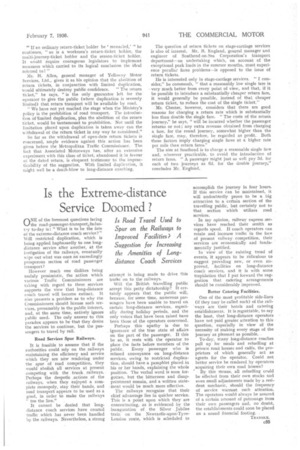Is the Extreme-distance Service Doomed ?
Page 109

If you've noticed an error in this article please click here to report it so we can fix it.
ONE of the foremost questions facing the road-passenger-transport„, hid ustry to-day is: " What is to he the fate of the extreme-distance coach service?" Will restricted duplication, which is being applied haphazardly to one longdistance service after another, at the instigation of the railways, eventually wipe out what was once an exceedingly prosperous section of road passenger transport?
However much one dislikes being unduly pessimistic, the action which various Traffic Commissioners are taking with regard to these services supports the view that long-distance coach travel will become extinct, It also presents a problem as to why the Commissioners should license such services, presumably in the public interest, and, at the same time, entirely ignore public need. The only answer to this paradox appears to be that they desire the services to continue, but the passengers to travel by rail. '
Road Services Spur Railways.
It is feasible to assume that if the authorities could rely on the railways maintaining the efficiency and service. which they are now rendering under the spur of road competition, they would abolish all services at present competing with the trunk railways. Perhaps the despotic .actions of the railways, when they enjoyed a complete monopoly, stay their hands, and road transport appears to be used as a goad, in order to make the railways
toe the line."
It cannot be denied that longdistance coach services have created traffic which has never been handled by the railways. Nevertheless, a strong attempt is being made to drive this traffic on to the railways.
Will the British travelling public accept this petty dictatorship? It certainly appears that the public will, because, for some time, numerous passengers have been unable to travel on certain long-distance services, especially during holiday periods, and the only voices that have been raised have been those of the operators concerned. Perhaps this apathy is due to . ignorance of the true state of affairs on the part of the passenger. If this be so, it rests with the operator to place the facts before members of the public. Every passenger who is refused conveyance on long-distance services, owing to restricted duplication, should have a pamphlet placed in his or her hands, explaining the whole position. The verbal word is soon forgotten, but the bitterness and disappointment remain, and a written state, ment would be much more effective.
The railways recognize that their chief advantage lies in quicker service. This is a point upon which they are concentrating, as is evidenced by the inauguration of the Silver Jubilee train on the Newcastle-upon-TyneLondon route, which is scheduled to accomplish the journey in four hours. If this service can be maintained, it will undoubtedly prove to he a big attraction to a certain section of the travelling public, but certainly not to that section which utilizes road services.
In my opinion, railway express services have reached their zenith as regards speed. If coach operators can retain and increase traffic in the face of present railway competition, their services are economically and fundamentally justified.
In view of 'the existing trend of events, it appears to be ridiculous to suggest providing new, or even improved, facilities on long-distance coach services, and it is with some trepidation that I put forward the suggestion that catering arrangements should be considerably improved.
Better Catering Facilities.
One of the most profitable side-lines (if they may be called such) of the railways are their hotels and catering establishments. It is regrettable, to say the least, that long-distance operators have not paid greater attention to this question, especially in view Of the necessity of making every stage of the journey as pleasant as possible.
To-day, many long-distance coaches pull up for meals and refuelling at private road houses and cafés, the proprietors of which generally act as agents for the operator. Could not better service be rendered by operators acquiring their own road houses?
By this means, all refuelling could be effected from their own stocks and even small adjustments made by a resident mechanic, should the frequency of service warrant such attention. The operators would always be assured of a certain amount of patronage from their own passengers and, no doubt, the establishments could soon be placed on a sound financial footing.
TRANSEX.
c55




































































































































































